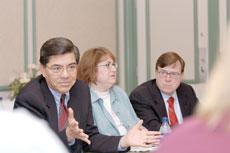From Chilé to Joplin

University President Julio León, Dr. Terri Agee, vice president of business affairs and Dr. Richard McCallum, vice president of academic affairs, visited with the Student Senate Nov. 17, 2004.
At the age of 17, Julio León left his Chilean home in a northern port city called Iquique. This summer, he will celebrate 25 years as Missouri Southern’s president.
As the dean of the school of business in 1982, León helped in the search for a new president.
“I was ‘in charge’ for a while,” he said. “After half a year, I was asked to apply for the job, and become a part of the search process, but I never dreamed I would be president for years. One never feels ready, there’s no training for that.
“However, by the time I became president I had already been at Southern for 12 years. I felt I had a good knowledge of the institution, I knew and understood my colleagues and I felt I understood the challenges this institution was facing.”
León faced some twists and turns on his journey from Iquique to Joplin. With a track and field scholarship in hand, he graduated from a normal school in Santiago, which led him to teach at an elementary school for 7 years. He taught in the afternoons and attended university classes in the evening at Technical State University of Santiago, Chilé.
After his time in Santiago, León traveled to the United States to be a middle-distance runner for the University of North Texas. After one year of training, he injured his Achilles tendon preparing for a competition and decided to go to graduate school.
León finished his PhD work in 1969 at the University of Arkansas and wanted to continue his education path at a nearby institution.
Southern had recently become a 4-year institution, and was one of the several León had applied to around Fayetteville.
León served as an assistant professor of business administration until 1973, when he was promoted to associate professor. Three years later, he was promoted to dean of the school of business.
León said the person who has helped him the most over the years is his wife, Vivian. He said she has been supportive and possesses the understanding of what it takes to be a university president.
In the 1980s, Southern was rapidly growing. There were funding challenges, as well attempts to develop new programs, but the most significant event was the development of the honors program.
“We feel that was a very important development for this institution,” León said. “The international mission and the introduction and implementation of the online business program are great accomplishments. I’m very proud of the honors program.
“It is very important and will continue to be for many years to come.”
León said over the years the original goals have never changed. There has always been a desire for the University to install programs and transform courses to the changing times, and he said those goals are being accomplished.
Southern sought university-level recognition in the early 1990s, but legislation making that a reality was passed until July 12, 2003.
“The right political situation was present and our legislators were able to accomplish it for us,” León said.
The institution successfully transformed, but León said Southern has always been divided in a way with its variety of students.
“It used to be that Southern was two different colleges, a daytime college for traditional age students, and an evening college for non-traditionals,” he said. “There were two different situations, and now we’re still two different institutions except that the evening college has become an online college for non-traditional students to a great extent because technology has made it possible.”
As Southern continues to grow, León said the funding per full-time equivalent student is not where it needs to be.
“We have been at the bottom,” León said. “We have received the least amount of funding per FTE student, but with the help of our legislators, the state has been jammed to address that.
“I think it will continue to change, while our legislators have been able to improve the situation quite a bit, but we’re still a ways from an equitable position.”
Your donation will support the student journalists of Missouri Southern State University. Your contribution will allow us to purchase equipment and cover our annual website hosting costs.



























